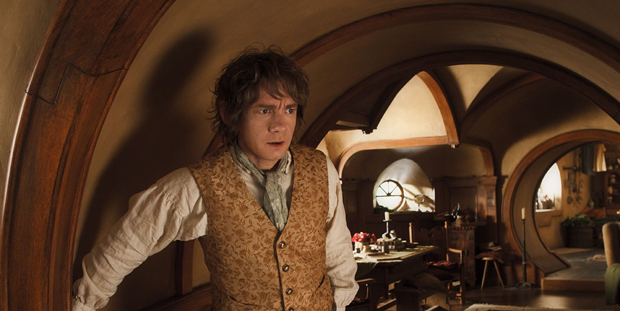Showing @ Cameo Cinema, Edinburgh and Tyneside Cinema, Newcastle from Fri 14 Dec
Peter Jackson / USA /New Zealand / 2012 / 169 min
Great criticism has already been levelled at Peter Jackson and the production team behind The Hobbit for deciding to spin it out as a trilogy. For all the reasons that The Lord of the Rings required three films, The Hobbit does not. Taken from Tolkien’s modest, less aggressive and more manageable book, there are signs that this will be an elongated affair of needlessly marathon proportion.
It has the potential to be a heroic slice of adventure, given Jackson’s previous experience of handling the sprawling environment of Middle Earth. The Hobbit begins 60 years prior to the rumblings of the fellowship, as Gandalf (Ian McKellen) seeks out Bilbo Baggins (Martin Freeman) from his ‘hole in the ground’ to embark on a mission with thirteen dwarves; almost unsurprisingly it involves reviving their fallen city and reclaiming an onyx-like treasure stolen by a fire-breathing dragon.
The buzz around Jackson’s latest film has been heavily focussed on technological aspects of the cinematography; the film is available in 3D and at the higher frame rate of 48fps (the industry standard is 24fps). The director’s pioneering pursuit of hyper-real and crisp definition means that vast, cavernous outdoor shots are almost alive with detail, depth and colour – and combined with the 3D actually work very well. This is The Hobbit’s triumph; scenes involving underground battles with trolls and intricate skirmishes between the dwarves and a group of orcs who hunt them are almost flawless. Even though interior shots suffer from this sharpness, it’s worth it to witness some spectacular New Zealand landscapes.
At the top of the film, McKellen’s Gandalf claims that ‘a good story deserves embellishment’ – he could well be talking about the film itself. The Hobbit is like a series of set pieces which push the limitations of digital cinema, computer animation and camerawork, involving huge encounters between titans that emerge from the rock and great cities savaged by invasion. But the story suffers as a result; McKellen gets the best lines in a script which delivers some shockingly awkward segments of dialogue, an overuse of cliché and uncomfortable genre self-awareness. Jackson is so concerned with emulating the imagination and diversity of Tolkien’s world, he has neglected immersing us in the narrative. And coming in just shy of three hours, he has no excuse.
Although Freeman plays the character of Bilbo Baggins with a sense of restraint and togetherness, at times it feels like he doesn’t fully give himself to the role in the same way that Ian Holm did. The same can’t be said for Andy Serkis however, who returns as Gollum with another stunning performance. A scene in which Gollum and Bilbo solve each other’s riddles produces the most intelligent and tense moments of The Hobbit, which is unfortunate in a film of this length. The trilogy will struggle to match the intensity, quality and exploration of the LoTR franchise, a comparison which is bound to be made over and over again, and it’s a real shame that Jackson couldn’t do more with the material proffered by Tolkien.
